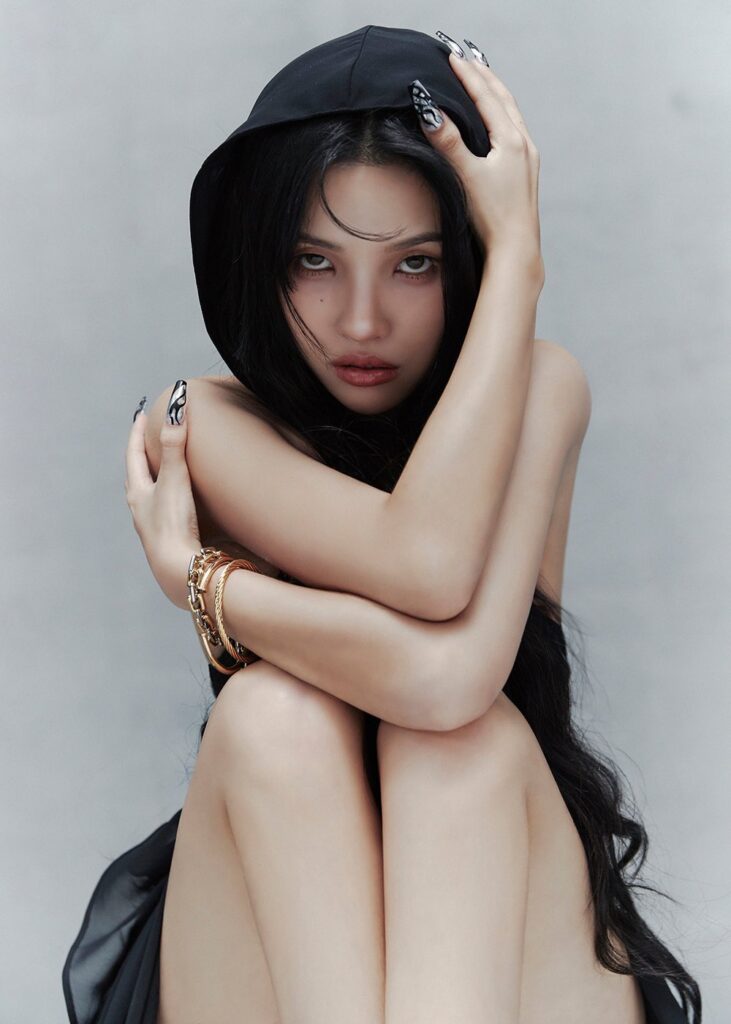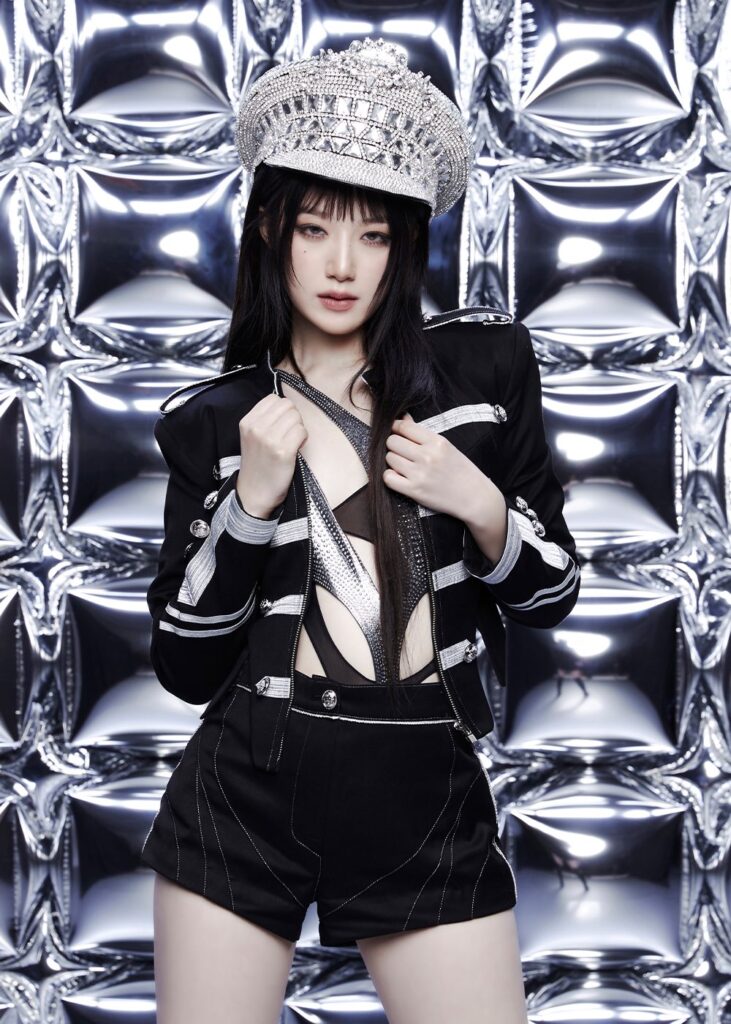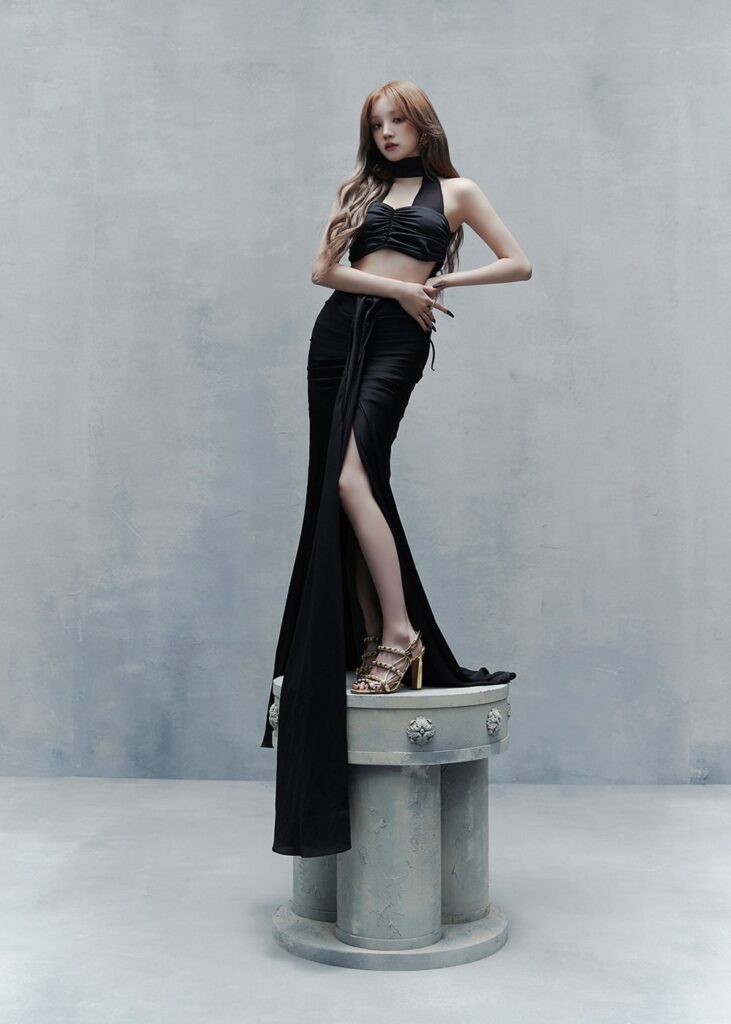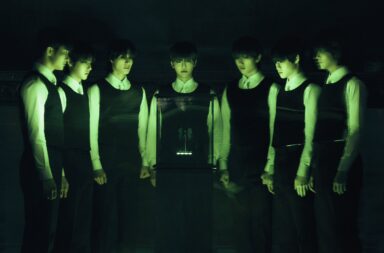
(G)I-dle are known for being “concept queens” and for writing and composing their own music. Leader Soyeon also produces songs, including the group’s title tracks, and develops their concepts. Soyeon, Minnie, and Yuqi, the group’s primary songwriters, all have distinct styles and approaches to songwriting. Their versatility is a major strength, but it also risks their albums lacking cohesion – and this tension is apparent on this new full album 2.
As with previous singles, Soyeon creates provocative and impactful concepts. Since 2022’s “Tomboy,” (G)I-dle’s singles have pointedly commented on gender norms and expectations of women. “Nxde” invoked Marilyn Monroe to decry sexualization and objectification. “Allergy” and “Queencard,” while less political, tackled body positivity and self-confidence. With these songs, the group managed to provoke while also writing catchy, fun hooks.
With their pre-release “Wife,” (G)I-dle continue these trends and also go satirical. “Wife” is a campy old-school hip hop track, with all members displaying their rap skills (Shuhua and Miyeon particularly impress here). Listeners who criticize Soyeon’s English lyrics for not making sense may find more here to dislike. In this song, however, lines like “I cook cream soup, taste is coco loco / Want me your wife, but she is mmm mmm mmm” feel entirely purposeful as mockery of the stereotypical roles of a wife. The sing-songy delivery of these lines gives the impression of addressing a child—or more precisely, a man-child.
Seemingly in contrast to the chorus, “Wife”’s verses are entirely full of sexual innuendo, such as in the first verse:
I knew it, so I just made some cake
But that’s not enough, pick the cherry on top
Kiss carefully and eat boldly
Tell me how it tastes
After grasping the risqué connotations of food imagery in the verses, one could easily read the “cream soup” suggestively as well. All together, the vocal delivery and lyrics ridicule men who only want women to serve their needs: pleasing them sexually, but also babying them. Notably, though, the song ends with an outro savagely declaring over an off-kilter beat, “but I don’t wanna wife.” The song pulls off a feminist message that is biting, but still fun.
Title track “Super Lady” announces itself as a bold anthem for women, with the sound of a car ignition, propulsive guitars, and Soyeon belting “I am a top super lady.” The song is a tribute to iconic women, with images in the music video alluding to figures from mythology (Medusa), fiction (Cruella DeVille), and history (Cleopatra). Aesthetically, the MV’s sets, costuming, and lighting evoke second-generation girl groups, especially 2NE1, as well as Western legends like Beyoncé.
Through references to I Never Die, among other works, (G)I-dle assert that they are a part of a history of powerful women. The lyrics also mention titles of hit songs from other fourth-generation girl groups (“Savage,” “Baddie,” and “Fearless”). This solidarity differentiates “Super Lady” from many other girl crush anthems—refreshingly, (G)I-dle’s confidence is not based on claiming superiority over other women.
Some sections of the song are electrifying, especially Miyeon and Yuqi’s soaring pre-chorus. However, the song is uneven in its execution: the drop chorus with the spoken line “lady, lady, call me super lady” feels anticlimactic. Because “Super Lady” runs under three minutes, various elements of the song lack sufficient time to play out. Specifically, Soyeon’s fast rap in the second verse lasts only four seconds. The YG-esque EDM outro could be even more satisfyingly bombastic, but it lacks variation and ends abruptly.

With only one song exceeding the three-minute mark, 2 is somewhat unsatisfying as a full album due to its pacing. “Super Lady” in particular feels unfinished, but the problem is not just within individual songs. Because the album includes many genres and styles, it can feel jarring to go quickly from one track to the next. The short song lengths exacerbate the album’s rushed, disjointed feeling. Previous albums like I Love, by contrast, had an overarching theme and narrative (the dark side of love) and a clear method of organizing tracks (Soyeon recommended listening in reverse order). As the first Korean album not following the “I…” naming pattern, 2 is missing elements that helped past projects feel more cohesive.
The B-sides themselves, however, are solid, with polished production, and effectively showcase each member’s individual talents. Soyeon has the greatest range in her compositions and production: pop rock song “Revenge,” for instance, contains a verse with Latin-inspired beats. Thankfully, in spite of its short length, the song is well-paced: Soyeon, for instance, gets an entire rap verse. The different elements of the song flow well, such when Minnie and Shuhua’s sultry vocal delivery in the first verse gives way to an ascending pre-chorus, with Miyeon and Minnie’s dramatic rock vocals and heavy, crescendoing synths. When the chorus drops, electric guitar and high-hats maintain the song’s intensity.
Soyeon’s other B-side “Fate” is an upbeat pop-rock song whose bright melody belies its pensive lyrics about mental health. In Shuhua’s surprising rap verse, she shares, “I lost the sense of concentration I had with caffеine / I feel like I’m going to throw up becausе I’m worried all day long.” The song’s percussive use of piano and guitar riffs in the verses and chorus adds a quirky quality, but also illustrates the determination to move forward. Unique on the album in both sound and theme, “Fate” depicts how individuals keep going in spite of obstacles.

Yuqi’s songs, “Doll” and “Rollie,” both project boldness and confidence. Lyrically, “Doll” is simple, admonishing a cheating ex-lover, “I’m not your doll, don’t cry.” Both “Doll” and “Revenge” both descend into “la la la’s” toward the end, giving the impression that they are filler lyrics, which is perplexing when the songs are so short. Fortunately, the instrumentals and vocals are the star here, particularly the plucky staccato in the verses that provides a slightly creepy ambiance. Minnie’s delicate singing in the pre-chorus reinforces this feeling, while Yuqi and Miyeon’s powerful delivery in the chorus conveys their conviction that no one can control them.
Hip hop track “Rollie” bears some similarity to I Never Die’s “My Bag” in its swagger, and even refers to the “red five diamonds” from that previous track. “Rollie” is notable for its trap beats and husky lower register vocals, which both project relaxed self-assurance. The song, with all English lyrics, is addressed to a love interest, stating, “I just wanna rock, I just wanna love with you.” The speaker of “Rollie” knows exactly what she wants and has the confidence to go after it.
Minnie has the most well-defined signature sound: dreamy indie-inspired pop. “Vision,” which Miyeon also co-wrote, is a light Jersey Club track whose beats drives the song. Combined with the beat, Soyeon’s laid-back rap flow and the members’ airy layered vocals contribute to a hypnotic feeling. This effect successfully reinforces the lyrics, which lure listeners to follow their desires “even if you lose everything.”

“7 Days,” which like “Rollie” is all in English, is a sweet, dreamy love song. The lyrics are not particularly original, conveying the idea that a lover is stuck in one’s head for all “7 days, like a dream forever.” Nevertheless, the hook is catchy and the song employs interesting tempo changes, incorporating UK garage beats with the quickening tempo to convey excitement.
The (G)I-dle members display impressive breadth in songwriting, not only developing their own individual styles, but making thoughtful choices in composition and arrangement to convey their intended messages. However, an album can be an art form that is more than a collection of songs. I wish that (G)I-dle would focus on album pacing and concepts as consistently as they do title track concepts, because doing so could elevate an album like 2 from good to great.
(YouTube. Lyrics via Genius [1][2][3][4]. Images via Cube Entertainment).


